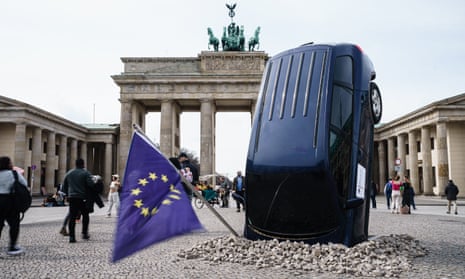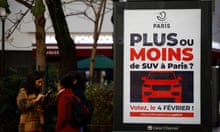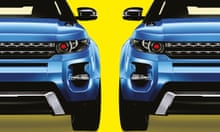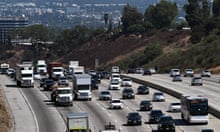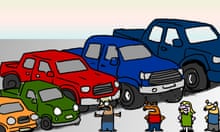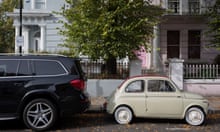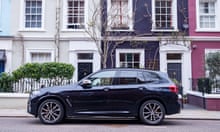Walking on a busy London street recently, I heard a shout. “Don’t hit me,” a cyclist screamed, as a Land Rover driver reversed into his path. Next, it was my turn to jump out of the way. The driver lurched forward, veering unexpectedly in my direction just as I was crossing a sidestreet.
A moment later, another panicked voice behind me; a little girl scooting in front of her mother overshot the pavement ever so slightly, and came just inches from the driver’s path. Behind the steering wheel the driver appeared impassive, apparently unaware of the consternation in her wake.
Perhaps you could dismiss this incident as an example of simple bad driving, but SUVs represent a unique danger on our cities’ roads. Their popularity has boomed in recent years. Drivers are drawn to the higher road position that offers a feeling of security. But research from the US has found that while SUV drivers are involved in fewer collisions overall, when they crash into children, the collisions are eight times more likely to be fatal.
More than 120 modern cars available to purchase on the UK market now overhang standard parking spaces, claiming ever more of our public space. These hulking vehicles were originally designed for off-road driving. And advertising campaigns featuring rugged terrains would have you believe this is how many are still being used. But in the UK, the overwhelming majority of drivers do not buy them to drive off-road: three-quarters of these vehicles end up polluting city streets, with a high proportion concentrated in the affluent west London borough of Kensington and Chelsea.
Alongside their growing popularity, there is also a determined momentum to crack down on their usage in European cities. In Paris, officials will introduce new parking charges next year for larger and heavier vehicles. Noting there are no dirt paths or mountain roads in the city, David Belliard, its deputy mayor for public space and mobility policy, said SUVs are “dangerous, cumbersome and use too many resources to manufacture”.
In the UK, after the tragic collision at a Wimbledon school involving the driver of an SUV, after which two children died, the European Transport Safety Council called for a ban on SUVs in populated areas. “Do people need two-and-a-half-tonne vehicles to take their children to school?”, said a spokesperson. “London has done a great job on restricting the movement of freight vehicles. There is no reason why you could not look at restrictions on these types of vehicles too.”
And yet banning SUVs is unlikely to be simple. For manufacturers, they have far superior sales margins compared with normal cars. Since 2018, manufacturers have been spending more on marketing for these vehicles than standard cars, sometimes more than all their other cars combined.
And the ads work. In the 10 years to 2018, SUVs went from a 7% share of the EU car market to 36%. They now make up half of all car sales in Australia, and 46% of global car sales, according to data from 2022, at a time when other car sales were dropping.
Fritz Gahagan, a former marketing consultant for tobacco, could have been talking about ads for SUVs when he said: “The problem is how do you sell death … you do it with the great open spaces … the mountains, the open places, the lakes coming up to the shore. How could a whiff of a cigarette be of any harm in a situation like that?”
The global tobacco epidemic was fuelled by savvy marketers to devastating effect. According to a small study in Australia, SUV fuel consumption may in fact be between 16% and 65% higher than advertised, and yet ads still present them as desirable vehicles, associated with beautiful landscapes and adventure. We must start challenging this faux reality.
What those ads leave out, among other things, is the fact SUVs use on average a quarter more energy than medium-size vehicles. They generate almost 1bn tonnes of CO2 emissions annually – the amount by which we overshot our Paris agreement targets. Their increasing adoption is directly contributing to the climate crisis, according to the International Energy Agency.
Campaigns such as Badvertising and Comms Declare are calling for increased regulation of the way SUVs are marketed because of their substantial negative impact on our efforts to meet carbon-cutting targets. But there is more to be done to diminish their presence. Let’s start with charging drivers who insist on owning large vehicles proportionately to their damage to our roads, our safety and environment. This could be through vehicle excise duty (car tax) and road-user pricing – a per-mile road user levy.
Levers such as low emission zones may be causing tensions politically, but the evidence shows they work to clean up city air. We could follow the example of our French neighbours; the city of Bath, which is consulting on emission-based charges; and London councils such as Islington and Tower Hamlets, which have introduced higher charges for parking the most polluting vehicles. If these measures end up costing people more, why not pass the cost back to the companies responsible?
The horse may have bolted on SUV ownership, but we do have tools at our disposal to discourage people from driving these dangerous vehicles. Now is the time to put our foot down.
Laura Laker is a journalist who writes about cycling and urban transport
